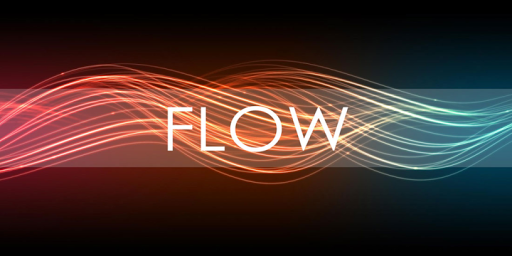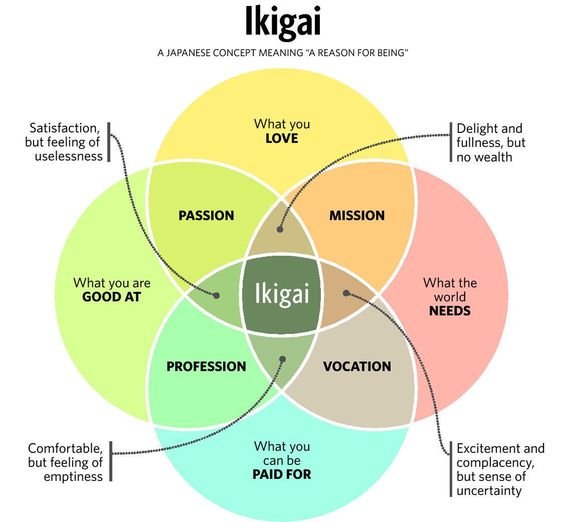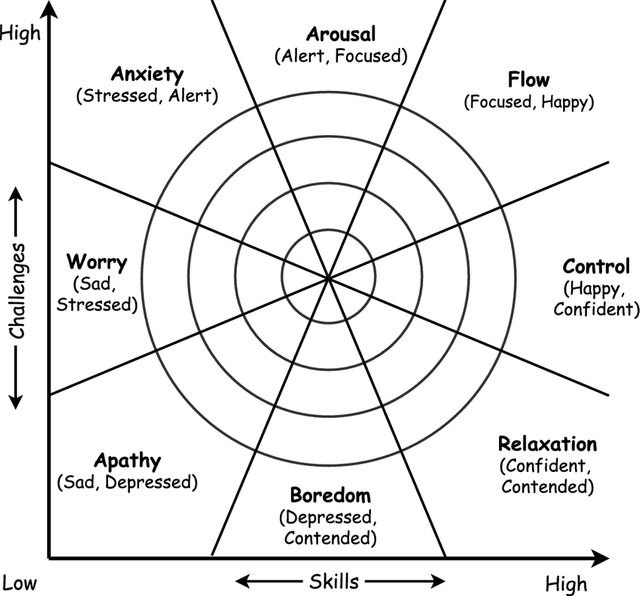Flow state is a concept of positive psychology phrased by Dr. Mihaly Csikszentmihalyi in recent years.
📃Being in flow state is described as being in a highly focused yet highly relaxed state where time seems to flow differently, all necessary actions happen in the most efficient way possible and the sense of separate self ceases to exist activity and performer are one, subject and object become one.
This is how being in flow is described as.

⌛The history of flow spans way back to the era of ancient philosophy, most commonly known as "Zen", the flow state is a state of mind and being of calm-focus, where one loses their sense of self if too deep into it and the line between individual and the rest of reality seems to blur.
The concept of flow is often associated with High Performance and Sports however it is seen in all sorts of activities, from speeches to games and so on, it can happen in all sorts of hobbies.
What we will explore in this article is a different approach into how to induce the flow state, that's right.
To begin, let's first connect the dots of what the conditions that are required in order to reach the flow state actually are.
How will this be useful though?
If you are an athlete of any hobby this is a known theme and will help greatly with high performance,
If you are working this will also be useful to you to make your work feel more fun,
If you are on a spiritual path this will also be useful since the origins of those mind-states stretches back to spirituality and philosophy.
Personally I think it can be used everywhere and for everything, it is possible you are in flow right now or all the time, the question is... in relation to what. The dynamic is always relative.
There is a Similar Japanese Concept which may be discussed in a future post, "Ikigai" similarly to "Dharma" or Golden Path is the path by which there is an overall flow or flow of life.

-There is also a TL;DR Section below in case you have no time to read all of it, if you want to read it later remember you can bookmark the page.
In order to have a flow state you need a balance of two things, one being "interest" or "will" and the other is "acceptance", "belief" or "confidence", as an example you might consider in a game that if your interest to play and win is high but your belief that happening is high also then you will enter the flow state, you would need to find a state of meditation during the match in order to do this.
I will explain my understanding of how meditation works and you can slot-in your understandings as you see fit.
Since meditation focuses on the consciousness of the person, let's start by understanding that dynamic, we are going to use some sort of blueprint to understand it better.
Assuming you are consciousness as in, the observer.
That would imply either that you observe something other therefore you disassociate you from that or if you are interested in something deeply then you start to merge with that as an observer and you become that which you are fascinated about from that context.
What differs here is your attitude towards the "thing" that is observed. If you are deeply curious, you lose yourself to it and if you are not then you ignore it or separate from it.
In meditation we practice many things but one thing is basically observing, we observe our actions and thoughts which in turn disconnects us from them and that gives enough room for us to connect to something else, it's like zooming-out in order to be able to zoom-in somewhere else. How that feels is like floating in space.
That's why when people are angry, sad and so on, they are basically associated too much with certain processes without the confidence to back that up, there is little bandwidth so to speak to allow for anything but frustration or sadness and that makes them unable to switch that easily to a more serene state of mind.
Belief and Will are both one and the same actually, both are essential and one comes from the other in a cyclical pattern that sustains both.
So then, how do we achieve the flow state? Simple, as said above you have to have a goal or something interesting in mind, something to be excited about but not overly attached to it, something to look forward to.
For that we would need to think why do we get interested by things in the first place? thats usually curiosity, genuine curiosity. We lose that as we grow up, the sense of wonder. This happens because we believe (here it is) that we know everything or we do not need to know anything more than we already know. That's ego as in... we know what is to know. However that is simply not true, we do not know everything not even a fraction of what there is to know, that alone should be enough to excite people or off-put them.
In fact, accepting that we do not know everything opens us up to new things, to be able to take a new opportunity that we would otherwise not have.
Flow works because we are constantly in a state of wonder and pursuit but not because we might lose the opportunity, it's more of a wondrous pursuit, a curious one. You do not "know" what will happen in a game and that excites us because who knows what is going to happen, if you know then it is boring and if you know that something that you do not "want" "could'' happen then that makes you anxious/fearful. Obviously there is a pattern here and people often don't notice it right away but it surely is there.
The following Popular Graph suggesting where the flow State can be reached seems rather interesting, I tend to replace the "Skill" to "Belief" and "Challenges" to "Will".
Then we notice how this concept unfolds from there.
That seems to be one idea for a recipe to being in flow more often and consistently.

In Essence, Flow is the perfect balance between belief (confidence) and will (intention) or simply being interested/curious.
Now what is the key component of that graph? Emotions....
...as such, even Negative emotions can help us become better at entering flow, that's one way to go about it.
If our interest/will is conflicting with the contents of a belief/thought process then it will create a negative emotion such as anxiety for something that is referring to future events OR sadness for something that already happened which we did not want to.
Why does this happen? it happens because we limit what we want, we encase it within a very limited and rock-solid limitation of what it should be.
Unrealistic expectations and any expectations for that matter can lead to suffering, that's well known in eastern philosophy, it's called "attachment".
If I am attached to victory that will lead me to some games being suffering and some also being suffering or neutral, not exciting because I would be too busy worrying about "what ifs" and not focus on the activity to perform at my best.
I use emotions to show me when I am not in alignment with my higher aspect that can potentially outperform anything I can do outside of it. I use emotions as a compass to be able to navigate my mind and not as a dominant behavior control factor mechanism. I use emotions to be able to control emotions.
✨👉 Try this:
"If negative emotion then that means corresponding thought is false" this has to be noticed within seconds, meaning you have to start practicing that observer-mode more often, not saying you cannot speak, all I am saying is... observe yourself speak, observe yourself eat, observe yourself think etc etc.
🤔🙏Meditation is not about sitting cross-legged in some studio, no, you can do that but its optional and just one way of doing so.
Meditation is about observation👁️🗨️ both inwards and outwards as mentioned, no simple contemplation albeit contemplation is within the realm of observation.
🌌How I figured out this dynamic is based on personal experience, which I later looked into in many sources in order to confirm my hypothesis for personal use. Meaning this is not strictly an academic article and is mostly aimed for giving people a different perspective on the matter and potentially be able to practically apply it.
There is a lot of data and literature about this dynamic although it is either used or understood in different ways and has other more subtle applications, usually it is theoretical content.
More specifically this has similar conditions as the thing called "eustress" which means positive stress, normally stress is not considered good but some people say it can be, that's actually partly false. It can be positive given the right circumstances under which the stress is not negative but something totally different, it is not even stress at that point, you might want to look that up for yourself of course.
Another observation about this is how usually the experts of this field related to the flow state and coaching would always express how you need to be in the middle of boredom and stress, therefore will and belief are the correlated themes for obvious reasons, to briefly simplify the reasoning: Too much wanting leads to attachment which leads to anxiety/sadness and suffering. As opposed to believing without really being interested or wanting leads to boredom therefore you will lack the energy to go about the series of tasks required.
Hopefully you can see the pattern, its a reverse-engineered version or a bottom-up approach.
There is a lot more behind this dynamic but this article won't fit everything and it will be harder to read, so I will just pause here and hopefully this will be enough to help you out in some way.
🧾.::TL;DR::.🧾
To enter flow state you need to be interested/want something including the process! It has to be autotelic.
You have to find it interesting! To have the sense of wonder! How do you do that? by accepting the fact that you do not know everything and that you live in the present, what is to come after that is a total mystery and a delight to find out, that attitude brings you into the sense of wonder.
Next you need belief/acceptance, Accept that you can achieve it and accept that you can follow-through, accept both possibilities and be okay with them while also as said before, keeping that "interest"/sense of wonder Up.
Tip: We might fear the mystery but it also brings excitement, mystery is the unknown and from the unknown there is enough room to conceptually create something, if you don't know you can choose more freely.
This is how you do it, how to monitor it and stay in it? You use emotions, emotions reflect the processes in your mind, if belief and interest/will conflict that creates negative emotions, treat emotions as indicators and not as facts, they are not supposed to be facts but just that, indicators.
If you feel anxiety it means it is something that you think/believe will happen that goes against your will, If you feel sadness it means it is related to something that happened in the past that you didn't want to happen. (The attachment to results can cause that too)
IF you feel bored, unmotivated and lacking energy that means you are un-interested in the process and/or goal. The task ought to be autotelic, meaning self-fulfilling.
You have to feel good just by doing it regardless of the expectations or goals. This autotelic cycle is essentially what flow is from our perspective.
Remember that emotions and their corresponding beliefs/thoughts can stick around, meaning this can scale from the micro to the macro, from temporary to chronic.
"Fixes" to all those indications can be found above in this TL;DR.
Author: Thanks for Reading and have a Great Day! 👍